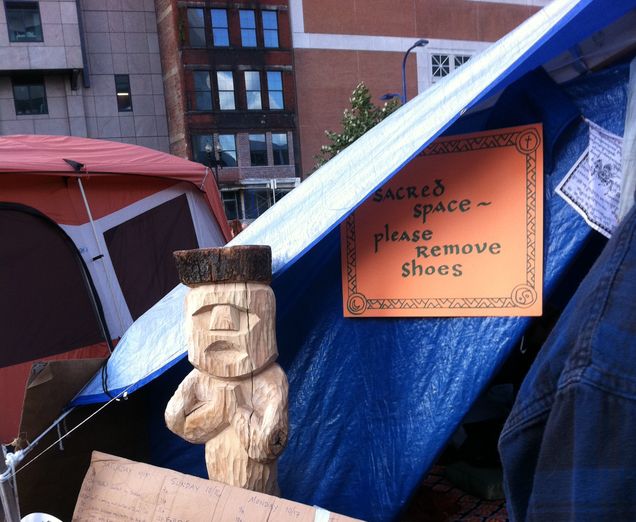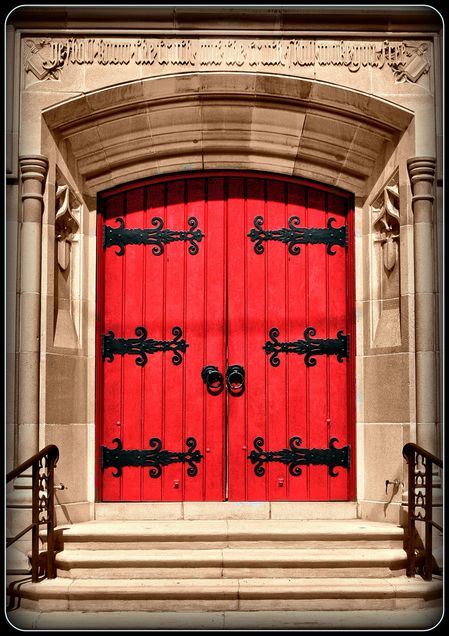How to Engage Occupy as a Seminarian
A walk through the Occupy encampment in downtown Dewey Square, or a web search of the ‘Occupy’ movement reveals a myriad of voices speaking out about the current economic and social conditions of our country:
- Concerned citizens calling for greater accountability for financial institutions, corporations and government bureaucracy.

- Labor unions, employed, under-employed, and unemployed citizens calling for jobs and job security in a time of unemployment unprecedented since the Great Depression.
- A student movement calling for forgiveness of private-gain, public-risk student loans which have increased exponentially in recent years.
- Occupy the Hood and Occupy the Barrio, two movements representing the voices of communities of color, calling for a response to the poverty and violence which have plagued their communities for longer and more profoundly than any other community within the Occupy movement.
- Veterans for Peace advocating the end of America’s foreign wars, and memorializing and mourning the deaths of their loved ones.
- Pro-Palestinian activists calling for the end of the Israeli occupation of the Palestinian occupied territories.
- Feminists calling for women’s rights and an end to gendered violence.
The Occupy Wall Street movement is not one homogenous movement. The diversity of voices within the Occupy movement has been formed by the diversity of lived experiences among its participants, and while the inclusion all of these voices in the movement has been a great plus, they can also cause confusion or division within the movement as it grows.
Should seminarians and faith leaders engage this seemingly disparate, chaotic Occupy movement?
Already, believers from many faith backgrounds (e.g. Christian, Jewish, Muslim and Buddhist) have shown their solidarity with the movement. The presence of a faith and spirituality tent at some rallies, as well as protest chaplains from various faith and denominational backgrounds, beckons seminarians to become involved with the movement. Among Christian groups, organizations and seminaries such as #occupychurch, Sojourners, and Union Theological Seminary, have made particularly vocal statements of support for the Occupy movement.
Whether or not we agree with the mission or the means of the Occupy movement, as leaders of faith, are we not called to respond to the contentious and significant issues of our time? This is an opportunity and challenge – not only to make ‘Occupy’ relevant to church, but for Christianity to be relevant within and for the generation of ‘Occupy.’
Here are a few ways we can engage ‘Occupy’ as part of a theological community.
Educate Yourself
If you are in seminary or graduate school, you’re likely already generally informed about many of the social and economic issues of our country today. But truly knowing and understanding the issues is different from being informed by the scholarly articles, news articles, and blogs which so often fill the life of a graduate student. To truly understand the movement means to stand beside those involved with and impacted by the movement, and to listen to them and to engage them in dialogue.
So if you haven’t already had a chance to go down to one of the ‘Occupy’ protests or encampments, I encourage you to do so.
You don’t have to hold a sign at first – or ever. Simply engage in the practice of active listening, ask participants about their involvement, and dialogue with others who are for or against the movement. Where do their critiques and/or supports come from – a logical or emotional stance?
If they are coming from a place of logic, research their data.
If they are coming from a place of emotion, don’t cast their argument aside; take into account their story and the richness that it brings. Only then can we truly understand the richness and diversity of this movement, and, ultimately, the good it may do.
Reflect on Your Own Position
It’s not enough just to educate ourselves through listening and dialogue. We also have to practice the art of personally reflecting upon each of our backgrounds, experiences and privilege, and understand how those have formed our personal understanding of the movement.
How has your privilege affected our understanding of the Occupy movement? If you’re in seminary, this likely means that you’re working towards at least your second degree in higher education. Can you truly call yourself underprivileged compared to persons who have not had the opportunity or means to pursue a graduate degree, or even a college degree?
Whether through education, class, gender, race, religious background, and/or sexuality, how have these privileges affected those outside and within the Occupy movement? How has it informed your varied and diverse understandings of the systemic oppressions which the Occupy movement is protesting? Your diverse experiences have surely contributed to your willingness to be open to and trust certain perspectives of the ‘Occupy’ movement and to discredit or reject other perspectives (particularly those that push you outside of your comfort zone).
Rather than being discouraged that we are all at times blinded by our own privilege and experience, we must lend ourselves to a practice of humility. Humility in the context of ‘Occupy’ can be enacted through a willingness and openness to learn from others who have had different experiences and perspectives than your own. We can also be hopeful that that our experiences and privilege – which at times may have contributed to our own blindness – will provide us gifts to promote the message and mission of Christ within the world.
Take Action
Life experience, education, dialogue, and reflection equip us with a critical understanding of how we might best engage the Occupy movement and use our gifts. The gifts you bring to the table are unique, as are the gifts of your congregation or faith community. Just because you’re not camping out at Dewey Square doesn’t meant that you’re not part of the movement. Dialogue and action – whether in the blogosphere, in your local university general assemblies, in classrooms, or through community activism – are all critical components of this movement.
Furthermore, as the winter weather comes and more measures are taken to ensure the ‘security’ of the Occupy encampments, the physical presence of occupiers in the downtown financial districts throughout the United States will inevitably come to an end. What happens then – in the next phase of the movement – will be critical in determining the significance and success of the movement in actualizing change.
Be Critical
If you aren’t quite sure of the movement yet, your critical voice is still valuable. Each skeptic who critiques the movement sharpens the movement by questioning its weaknesses and activating untapped imaginative possibilities.
Which issues of the Occupy movement speak to the experiences of those in your congregations, and how can you engage the questions of the Occupy movement with your congregations across lived experiences of class, race, gender, sexuality and politics? How can you make your faith relevant to a movement which has already made itself relevant to multiple experiences of faith?
For seminarians, this is a great opportunity for education and training. This will not be the last socially contentious event you will have to deal with as a leader of a community of faith, so embrace this opportunity, even if you don’t find yourself embracing every aspect of the movement itself.
Kelly Hill is a 2nd year Master of Theological Studies student focusing in Religion and Conflict Transformation. Join the Occupy panel discussion: “The State of America: How did we get here? What can we do?” on Wednesday November 30, at 7pm in the BU Communications Building, Room 101. BU Occupies Boston will participate in a Unity March/Rally on December 3rd in collaboration with various other Occupy groups beginning at Marsh Chapel in the morning and culminating at Copley Square from 1-4pm.







December 3, 2011
Kelly, this is a great article- thanks for writing it. I’m so glad some STH folks are taking up this cause and engaging the issue – it is exactly what needs to happen. Thanks for all your efforts!!